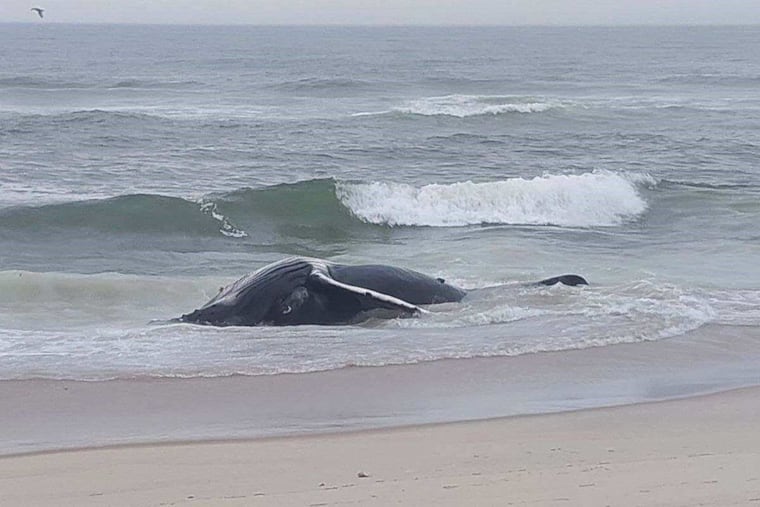Dead humpback whale found in surf at Long Beach
It is too early to tell what caused the whale's death, officials said Thursday.

The Brigantine-based Marine Mammal Stranding Center said that a 20- to 30-foot-long dead humpback whale was found Thursday in the surf on Long Beach Island in Ocean County.
The report said the whale was discovered at 6:45 a.m. after officials at the center received a call reporting the whale found at 51st Street in Long Beach Township. As of Thursday afternoon, township police were on the scene.
A representative at the center said that the death was still being investigated and that no further information was available. The center plans to provide updates on its website.
» READ MORE: Dead whale in New Jersey had a fractured skull among numerous injuries, experts find
It is the latest death of a humpback whale since January 2016, when the fisheries unit of the National Oceanic and Atmospheric Administration (NOAA) say deaths of the species began to rise. NOAA officially declared an “unusual mortality event” in April 2017, referring to increased deaths of humpback whales from Maine to Florida along the Atlantic Coast.
Before Thursday, NOAA reported that 29 humpback whales had been found dead in New Jersey since the unusual mortality event began. Of the total, 21 had been found onshore and eight offshore, according to NOAA.
Though New Jersey was cited as the location where the whales were discovered, that does not necessarily mean the death occurred there, as carcasses can float across state borders.
Overall, 218 whales have been found dead along the Atlantic Coast since 2016. New York state, with 45 deaths, has had the highest number of mortalities. New Jersey is tied with North Carolina with the fourth-most number of dead whales.
NOAA scientists say partial or full necropsies have been conducted on about 90 whales. About 40% of those had evidence of either striking a ship or becoming entangled in fishing gear. NOAA has assembled an independent team of scientists to review data and determine how to investigate the phenomenon.
» READ MORE: Whales navigate a perilous route off the Jersey Shore
In New Jersey, those opposed to offshore wind projects along with other Shore-based groups have pointed the finger at offshore wind projects, saying surveying vessels that use sonar and other methods to map the ocean floor may be a factor. NOAA and other scientists, however, say there is no such evidence. Regardless, the claims created significant political heat for the administration of New Jersey Gov. Phil Murphy, who had championed offshore wind as a way to combat climate change and increase the state’s renewable energy portfolio.
» READ MORE: How pro-fossil fuel groups helped sway the public against offshore wind in New Jersey
Last month, the New Jersey Department of Environmental Protection commissioner and New Jersey Board of Public Utilities announced $3.7 million in funding for research “to ensure ecologically responsible development of offshore wind energy.”
Projects include the state’s ongoing Research and Monitoring Initiative, which includes an aerial survey of whales, and a satellite-based tagging study of humpbacks in and around offshore wind lease areas. Satellite transmitters will be attached to whales to better understand their feeding patterns and movements as a way of assessing potential risks on both lease areas and major shipping lanes.